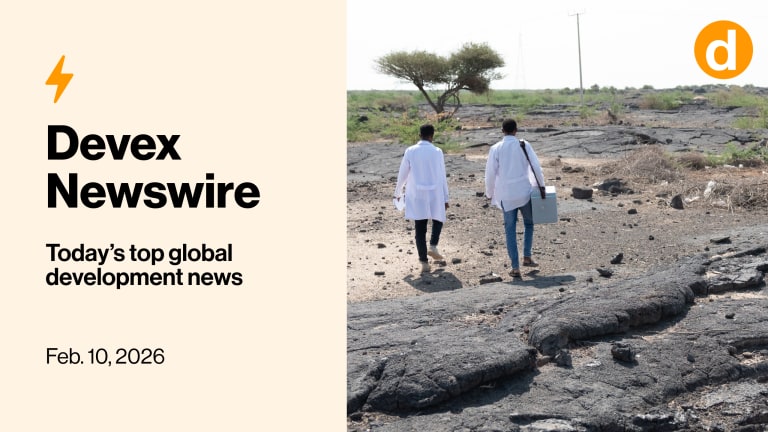Local professionals step in to fill delivery gap amid questions over resources
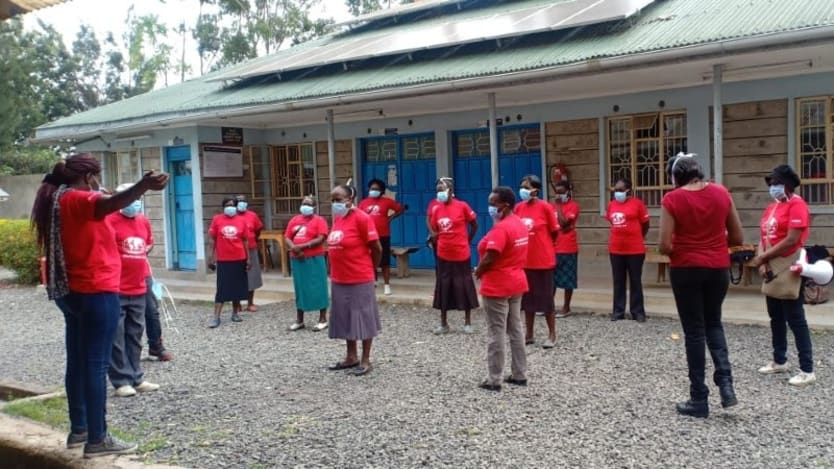
GLASGOW, Scotland/BRUSSELS — Travel restrictions are enhancing the role of local aid workers, but many say they are still not receiving the support they need, according to Devex's latest survey.
More on the COVID-19 Trends Tracker:
► COVID-19's unequal impact on global development professionals
► Development pros brace for more needs, less money post-pandemic
With the new coronavirus prompting the closure of borders, as well as travel restrictions within countries, 51% of development professionals said they have seen increased reliance on local professionals.
Some 62% said limited mobility will be one of the biggest long-term consequences of the pandemic on the sector.
“I don’t know if people will ever take a plane and put on a tie” for a committee meeting again, Naveen Rao, senior vice president for health at The Rockefeller Foundation, told Devex last week.
But professionals were divided as to what this shift means for how development work will be carried out in the future.
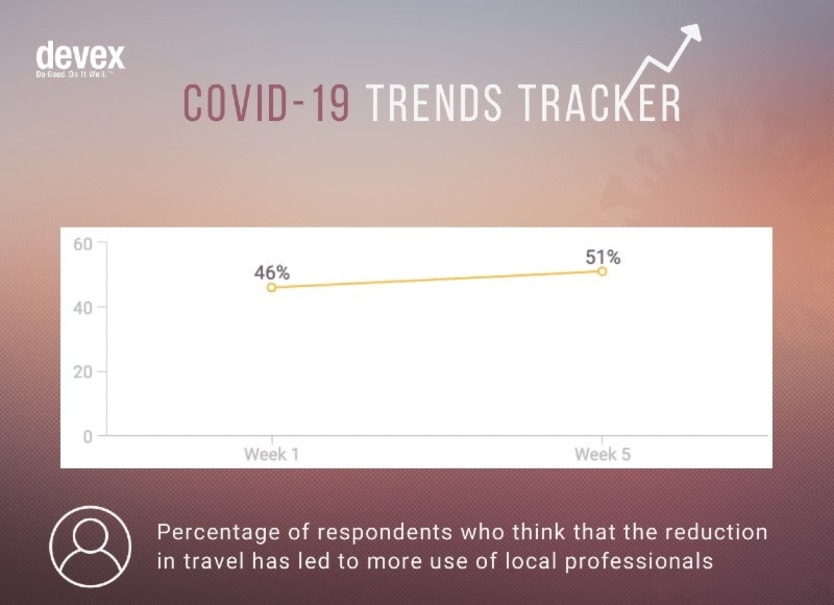
Some said it will support a long-term shift toward the localization of aid work. Zuzana Sládková, policy and advocacy coordinator at the European NGO confederation CONCORD, said that localization is “not a new trend; it’s just that COVID-19 can accelerate this. The local NGOs, they have the best knowledge on the situation in the partner countries.”
“As the possibility of working from remote is available to many institutions, non-local professional will continue to work.”
— An independent consultant in North AmericaBut others worried about the increased risk that local professionals are being exposed to and wonder whether their growing workload will come alongside a genuine increase in influence and responsibility.
The findings come from Devex’s latest COVID-19 Trends Tracker survey, which polled 593 development workers around the world between May 18 and May 26 to gauge the impact of the pandemic on the sector.
Survey respondents in most regions reported an increase in the use of local professionals, with 73% in Oceania now seeing this, compared with 36% in the region when Devex first surveyed professionals five weeks ago. Responses from development professionals in Europe, Asia, Latin America, and the Middle East also reflected the trend of a growing reliance on local professionals over the course of the pandemic. In Africa, those reporting an increase in the use of local professionals has remained stable at around 50% since the survey began.
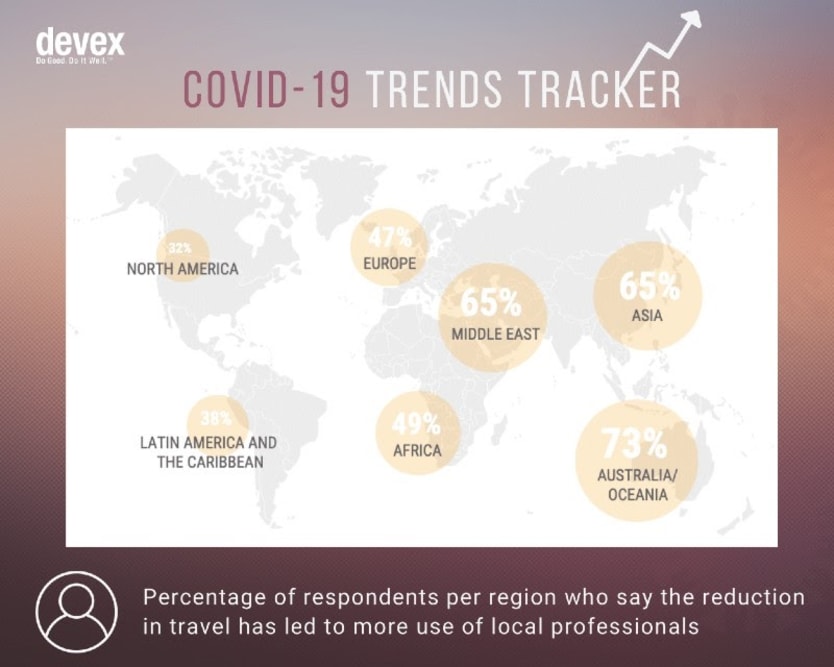
One independent consultant in Asia said that local professionals were doing much of the “heavy lifting” on projects even before the pandemic hit, due to the high cost of foreign experts. “The workload [for locals] is likely to increase,” the consultant wrote. “However, there is no certainty if their compensation and more importantly other benefits will increase.” The consultant also suggested that local professionals do not enjoy the same medical benefits or hazard pay as their international peers.
Disparities between local and international aid workers have been highlighted during the pandemic, with reports of some expat workers being provided more support by their organizations than locals are.
Would you like to find out more about how global development professionals are responding to the COVID-19 pandemic?
Get in touch with surveys@devex.com to explore a partnership.
With many expats evacuated back to their home countries, one donor-employed professional in Africa said local staff members had more opportunities but were not properly resourced. “Still they [local workers] did not get support and [funding] to improve their capacity,” the respondent wrote. “If improved, the capacity of local professionals will lead [to] long term changes and reduce the dependence [on] foreign staff.”
Others were more optimistic about the potential for change. One professional working with a donor in Oceania wrote that local consultants’ terms of reference were being expanded, with this likely to lead to longer-term change.
In March, Devex reported on a case in which a senior international consultant from England, unable to travel to Indonesia, instead delegated the fieldwork to a local consultant whom he had initially engaged as a translator. The pair coordinated by Skype and the senior consultant said he would consider the same approach in the future, even once restrictions are lifted.
However, an independent consultant in North America pointed out that COVID-19 was also limiting local professionals’ movement and driving them to work online, too.
“As the possibility of working from remote is available to many institutions, non-local professional will continue to work,” the North American consultant wrote. “I do not think the COVID 19 situation will create the situation of replacing non-local professionals with local professionals.”
“There will be no change in expat vs locals unless governments specifically restrict this,” one NGO worker in Africa added. “Unfortunately the development and humanitarian sectors are very reluctant to nationalize and continue to be western biased.”
Visit our dedicated COVID-19 page for news, job opportunities, and funding insights.
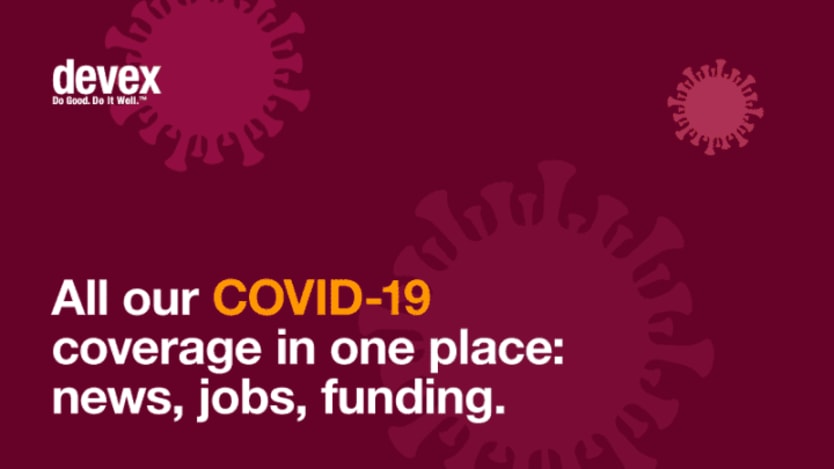
Search for articles
Most Read
- 1
- 2
- 3
- 4
- 5






